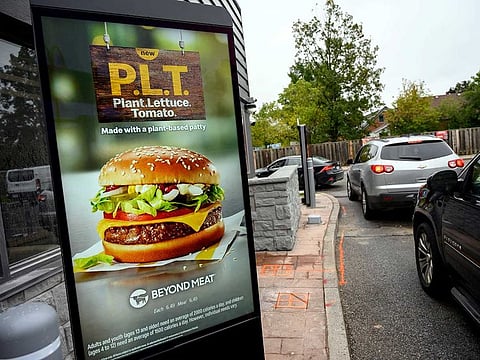Investors will find plant-based meats to be fertile ground for returns
Category has real prospects to emerge as high-growth option in food business

Droughts, famines, cyclones – as global climate change affects populations with ever-increasing regularity, governments are looking for ways to transform unsustainable industries and reduce carbon emissions.
While this presents many challenges to scientists and policymakers, it creates opportunities for investors looking to capitalise on the latest innovations made in response to these challenges. Some of the most exciting breakthroughs in recent years are being made in plant-based and cultured meat alternatives.
The global industrialised meat industry is increasingly being called out for its negative ecological impact. From methane and fossil fuel emissions to land and water consumption, deforestation, chemical effluents, antibiotic resistance and more, the meat industry is now recognised as one of the world’s most unsustainable sectors.
Science helps out
Salvation, as usual, comes in the form of science and innovation.
We are seeing the rise of plant-based meat substitutes. These vegetarian and vegan options are becoming popular with eco-conscious consumers, and the fast-food giants are taking note, with several global franchises to make plant-based options a permanent part of their menus.
Strides have also been made in the field of cultured (lab-grown) meats, where meat cells are produced using donor cells from a live animal, with lipids, amino acids, minerals and water added. It may be a while before this technology is sophisticated enough to replace a good old-fashioned ribeye steak.
The real potential for this industry lies not in prime cuts of beef, but more in the biggest consumer of meat globally – the fast-food industry, in the form of processed meats for hot dogs, burgers and chicken nuggets.
Grow it
Plant-based substitutes alone are set to make up one-third of the total meat market by 2050. One of the most important indicators of growth is that the big global meat companies such as Tyson Foods, the world's second largest processor of beef and chicken, are heavily investing in these alternatives. By 2040, 60 per cent of the meat consumed is projected to either be plant-based or lab-grown, representing a colossal shift in the industry.
The global meat market was valued at $945 billion in 2019 and likely to reach more than $1.1 trillion by 2023. Traders in the commodities markets are well aware that the price of beef and poultry livestock commodities increased by 23 per cent and 18.8 per cent respectively year-to-date.
These attractive gains are largely thanks to merchants looking to hedge against currency fluctuations and disruptions to global supply chains.
Yet another 'commodity'
This demonstrates that the price of the meat doesn’t actually reflect day-to-day consumption – it is, in fact, simply another trading investment with the potential to generate good revenue for traders who don't want risky exposure to the real market.
But what about meat alternatives? The cultured meat market is estimated to be valued at $215 million by 2025, and $540 million by 2032, with a whopping 15 per cent growth in the coming decade. The Middle East and Africa are likely to have 20 per cent of the global cultured meat market by 2027 (estimated at $100 million).
The value of the UAE’s meat market is estimated to reach $5.5 billion by 2022, while the overall expenditure on F&B in the UAE is projected to increase by 6.9 per cent year-on-year, heading to $37 billion this year. With an increasingly health-aware and eco-conscious population of more than 8 million across a broad range of backgrounds and nationalities, the trend of plant-based meat is likely to increase by 5 per cent YoY.
Grow local
The coronavirus crisis demonstrated to everyone the importance of sustainability and investment in localisation due to global supply chain disruptions and border closures. Aside from environmental concerns, cultured and plant-based meats have the added bonus of being able to be produced locally, reducing a country’s dependence on global supply chains and improving food security. The global plant-based meat industry has grown by an incredible 264 per cent since global lockdowns began.
The high potential of meat alternatives is well-established. We have already created investment products to allow customers to invest in sustainable, eco-friendly commodities that offer promising returns... and we expect this trend to grow exponentially.

- Chaddy Kirbaj is Vice-Director at Swissquote Bank’s Dubai Rep. Office.
Sign up for the Daily Briefing
Get the latest news and updates straight to your inbox





